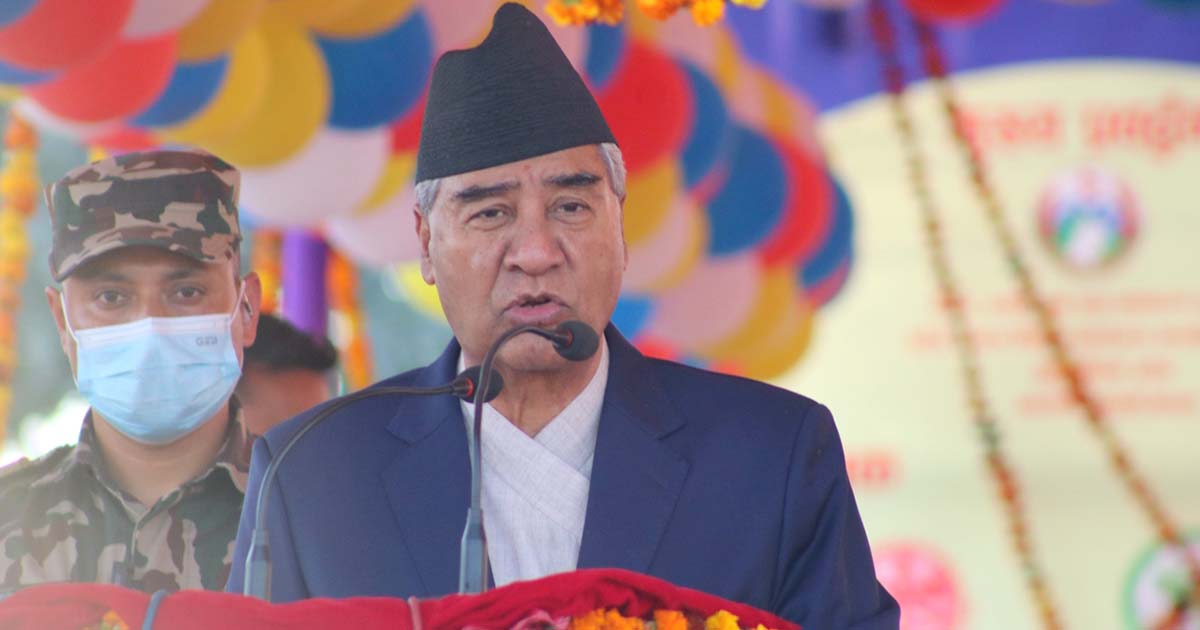Security officials urged not to meet leaders, diplomatic officials without prior permission
The Home Ministry has directed security officials not to meet leaders and diplomatic officials without obtaining prior permission. Issuing a notice on Thursday, the Ministry has directed the security officials not to meet embassy officials and political leaders without taking approval from the concerned department. The statement issued by Ministry spokesperson Phanindramani Pokharel said that disciplinary action will be taken against those found violating the directive.
Government to prepare draft of Common Minimum Program within five days
A meeting of the senior leaders of the ruling coalition has decided to prepare a draft of the Common Minimum Program of the government within five days. The meeting held at the Prime Minister’s official residence in Baluwatar has decided to form a committee under the headship of CPN-UML Chairman KP Sharma Oli to prepare the draft. Speaking to journalists after the meeting, Home Minister Rabi Lamichhane said that the draft of the government Common Minimum Program will be prepared within five days. Minister Lamichhane, who is also the Chairman of the Rastriya Swatantra Party, said that the meeting has also decided to send one member each from the ruling parties to the committee. “The committee will prepare the draft of the Common Minimum Program within five days. The final shape will be given after holding a meeting later,” he said. Prime Minister and CPN (Maoist Center) Chairman Pushpa Kamal Dahal, UML Chairman Oli, Rastriya Swatantra Party Chairman Lamichhane and Rastriya Prajatantra Party Chairman Rajendra Lingden among others were present in the meeting.
Prakash Sharan Mahat: NC will find out who’s behind the setback
In a surprise move, CPN-UML and CPN (Maoist Center) and other fringe parties have formed a coalition government, consigning the largest party in the Parliament, Nepali Congress, to the opposition bench. NC President Sher Bahadur Deuba is facing criticism over this debacle. Against this backdrop, Pratik Ghimire of ApEx talked to Congress Spokesperson Prakash Sharan Mahat.
How do you see the move of Pushpa Kamal Dahal?
Dahal's bottom line was that he must be the prime minister. In our party too, there were discussions on giving him the first premiership and we offered him the position at last, but he decided to go with the other alliance.
Who is responsible for such a situation?
Some leaders have resorted to social media to pinpoint specific leaders. Our party had officially decided to form a government under our leadership. As the largest party in the parliament, it was natural for us to claim government leadership. So, it is not appropriate to put blame on specific leaders. Yet, our President Sher Bahadur Deuba was lately in favor of keeping the coalition intact by offering Dahal the premiership.
Why did the Congress not adopt flexibility on power-sharing?
All leaders were on the same page that the party should claim both the president and prime minister. So, Deuba is not solely responsible for the current situation as claimed by the media and even some of our party leaders. There is a tendency to criticize Deuba. We would have faced more scathing criticism from party leaders if we had agreed to support Dahal as the new prime minister. Party leaders should realize that only a united party makes all party leaders strong.
As I said, Deuba was convinced at last that Dahal should get the premiership when the latter went to Balkot to form an alliance with UML. We even contacted Dahal and asked him to return. But Dahal said it was already late as he had made an understanding with the UML. Congress was flexible on this issue but a few leaders pressed our party president not to give away any of the important positions (to the Maoist party). They would not even participate in meetings and give their opinions publicly, thereby hampering the Congress-led ruling coalition. As a responsible party member, I had suggested to Deuba that we should be flexible to keep the coalition intact and he was positive too.
Being the largest party, Congress didn’t look prepared to be in the opposition. What will your party do now?
Yes, we were not ready as everything was moving in a positive direction. But we now have to review how this situation came about and who is actually responsible. The current ruling coalition consists of both pro and anti-federalist parties. Pro-monarchy and anti-monarchy forces are also there. This coalition has no ideological consensus, so it might break in the near future and we might return to power.
What role will the Congress play as the main opposition?
Since we are the largest party, we will make our presence felt in the parliament. We will not resort to vandalism and protests as our history doesn’t allow us to do that. In the past, we could not play an effective role as the opposition because we had a few parliamentarians who had won through the first-past-the-post system. This time, we have many of them and we will emerge as an effective opposition.
Advocate Dr Dinmani Pokharel appointed as attorney general
Advocate Dr Dinmani Pokharel has been appointed to the post of attorney general. President Bidya Devi Bhandari appointed Pokharel to the post as per Article 157 (2) of the Constitution on Wednesday, Sagar Acharya, spokesperson at the President’s Office said. The attorney general is the chief legal advisor of the government and is appointed by the President at the recommendation of the prime minister. Prime Minister Pushpa Kamal Dahal had recommended Pokharel to the post on Tuesday. Pokharel was the legal advisor of the then Speaker Onsari Gharti Magar. Attorney General Khamma Bahadur Khati resigned on Monday after the formation of a new government under the leadership of CPN (Maoist Center) Chairman Pushpa Kamal Dahal. There is a culture of changing the legal advisor of the government with the change of the government.



















